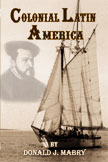Notes on Latin American Independence (revised)
By Don MabryIndependence Period
Not as ready as North America. Independence was precipitated by outside developments.
Some truth to this. Explains, to some extent, some of the problems of organization. By
many tests, organization of Latin America has not done remarkably well. It became
independent before ready but don't swallow completely.
In some places, warfare went on for a long time. The warfare was different in different
areas. Where warfare took place, it was a civil war as well as colonials versus Spain.
Bitter where it was class conflict. The wars often 1ed to hardening of the issues. Often
dichotimized the issues.
Became quite clear that there was going to continue aristocratic dispensation of some
kind. The independence movements didn't change the class systems and the privileges that
the upper class enjoyed. Some lower class persons did manage to raise their status.
Selection of constitutional republicanism with representative system started during the
wars. Why? Republicanism was the going thing. Monarchism was going out of style. Even had
they wanted to keep a monarchy, where would they get the monarch? What royal personage
would take one of the thrones? Monarchy gives stability.
Ruling oligarchies usually haven't meant what they said in constitutions; they were a
sop to the people.
The wars of independence removed most of the institutions that had protected the lower
classes, e.g. the Crown. Conditions of the lower classes worsened, generally speaking, but
couldn't have gotten much worse.
There was the abolition of slavery. Liberal view on slavery prevailed as it usually did
on the forms of government they chose.
Effects on upper class
- Varied from place to place.
- Most criollos went along with the independence movements.
- Most peninsulares tended to go along with the Crown.
- In some places, there were proposals for the expulsion of the Spaniards. Occurred in
some places. Most of the upper class was creole.
- The independence period lasted a long time, and affected later developments in many
ways.
Aristocratic social dispensation
Less rigid in the 20th century because of the some growth of the middle class. Meant
new parties, more educational opportunities, participation in politics and patterns
changed, advent of hordes of working girls in cities, etc.
Oligarchic governing systems retained an amazing amount of authority. They managed to
stave off agrarian reform. Latin America is a triumph of conservatism.
Violence in public life
- Not just militarism. Violence endemic in Latin American life. There was immense violence
in the colonial period. Why did it continue? Tremendous amount of illegitimacy with no one
to care for them; they had no stake in society
- The political system encouraged violence as means of change
- The peasantry were forced to live in horrible conditions. Faced problems of drunkenness,
banditry, and homicide. In Mexico in the 1920s, homicide was the 4th leading cause of
death and at least ten times the US rate.
Economic underdevelopment characterized these countries. All were "underdeveloped
"in the 19th century but Argentina developed in the late 19th century. Had the
problem of low productivity.
Heavy foreign influence or domination in national life. No banking at independence
period. Little banking in the 19th century. Foreigners came to supply needs. These
countries were dependent upon foreign countries for manufactured goods. Paid for them with
exports agricultural and mineral products.
Violence, caudillismo, militarismo, etc.
Include forced labor under this. Roots were in the general social conditions.
Caudillo=national boss; cacique=local boss.
Dependence upon violence to run a country is very dangerous and expensive. Requires
extraordinary expenditures on security forces. Caudillos don't usually last very long. The
19th century was largely the age of the caudillos; the 20th century saw the rise of
militarism. In Latin America, the enlisted men usually simply acquiesce to orders from the
officer corps. This was the consequence of the rigid class system. The farther down one
went in the socio-economic levels, the more likely one finds unquestioned obedience to
orders.
Latin American nations suffered from the "golpe do estado." These were
generally some of the officer corps overthrowing a civilian government or another part of
the officer corps. Usually peaceful. It is a way of changing governments as elections are.
Coup or golpe makers are a restricted number of "voters." Easy to conduct a
golpe because people have no stake in the existing government. It is important to
distinguish between coup/golpe and revolution. The latter involves changes in property
ownership and, usually, which class controls the government.
You can read about other topics in colonial Latin American history by buying and reading
 Colonial Latin America by Don Mabry.
Colonial Latin America by Don Mabry.
Click on the book cover or the title to go to Llumina Press.

